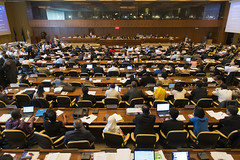ILO is a specialized agency of the United Nations


| Français - Español | |
| |
|
| > Homepage > Online information resources > Resource guides > History of the ILO | |
|
ILO activities in the post-war world (Part 2: 1960-1988)
|
ILO celebrates its 50th anniversary and is awarded the Nobel Peace PrizeIn his
report to the International Labour Conference (54th Session,
1970), the Director-General, David A. Morse, recalled that 1969 had been an exceptional year for ILO. In
almost all the Member States, special arrangements had been made to celebrate the
Organization′s anniversary and to enhance knowledge of the principles on
which it was founded, the results it had obtained and the work it had done.
The United Nations, its specialized agencies and various intergovernmental
organizations had joined in the 50th anniversary celebrations.
The year′s crowning event was the attribution to ILO of the Nobel Peace Prize. The Director-General, accompanied by the members of the Governing Board′s Bureau, received the Prize on behalf of the Organization on 10 December 1969. On that occasion, Mrs. Aase Lionaes, Chairman of the Nobel Committee, stated: “Beneath the foundation stone of the ILO′s main office in Geneva lies a document on which is written: Si vis pacem, cole justitiam – If you desire peace, cultivate justice. There are few organizations that have succeeded, to the extent that ILO has succeeded, in translating into action the moral idea on which it is based [...] In these fifty years the ILO has adopted over 250 Conventions and Recommendations. And even though not all of its 121 member countries have ratified anything approaching all the Conventions, I believe we are justified in saying that the ILO has permanently influenced the social welfare legislation of every single country” (see Nobel Peace Prize, 1969, pp. 6 and 10). Launch of the World Employment Programme (WEP)The
World Employment Programme (WEP) was established for two reasons: to make
the productive employment of a large proportion of the population one of
the principal objectives of national and international development
policies, and to help the Member States draw up and implement action plans
to that end.
Thus, as the Director-General, David A. Morse, recalled in his report to the International Labour Conference (53rd Session, 1969), the WEP required the full use of all ILO′s means of action. Technical cooperation and standard-setting efforts therefore had to be pursued and incorporate “a substantial research component, in order to throw light on the many technical questions of employment creation, and the training necessary to this end”. Over the years, the WEP has received broad financial support from various governments and international institutions (notably through the United Nations Development Programme – UNDP and the United Nations Population Fund – UNFPA). |
|
| Last update: 23.02.2015 | ^ top |












